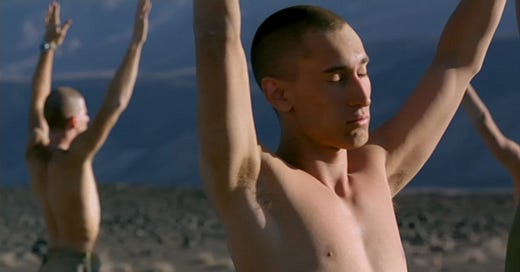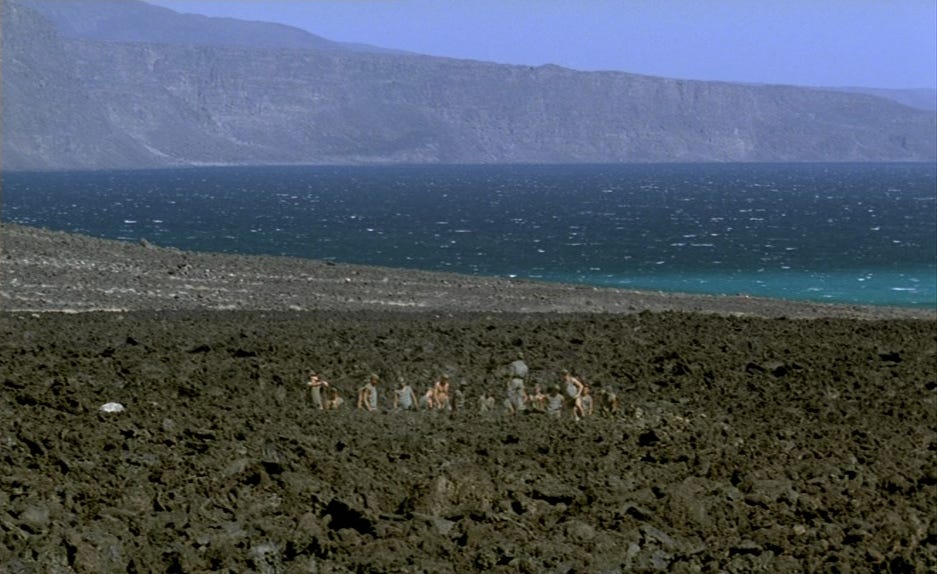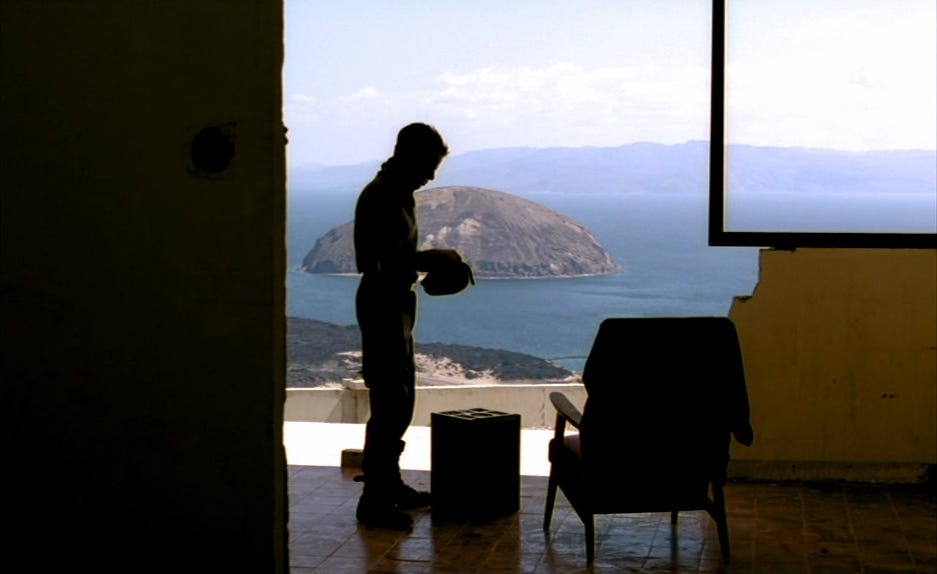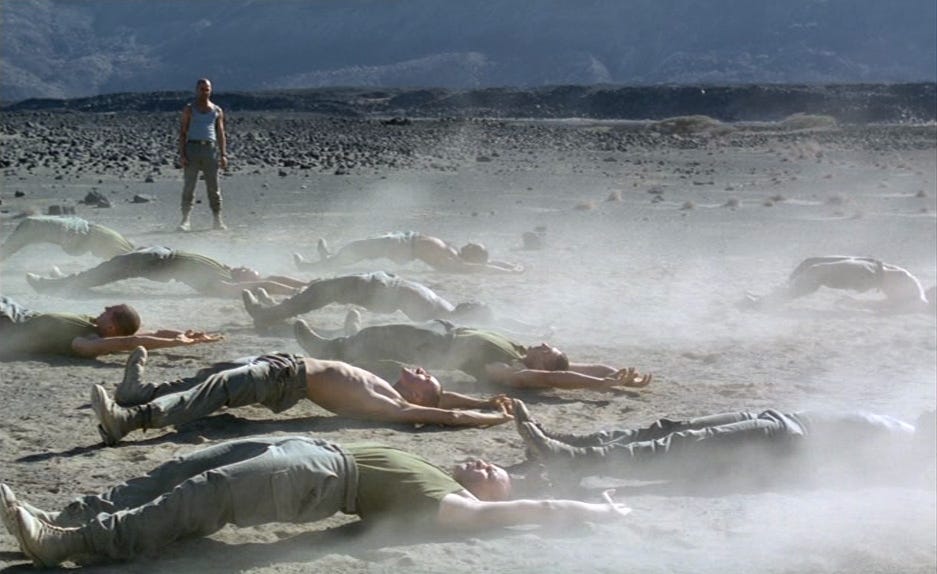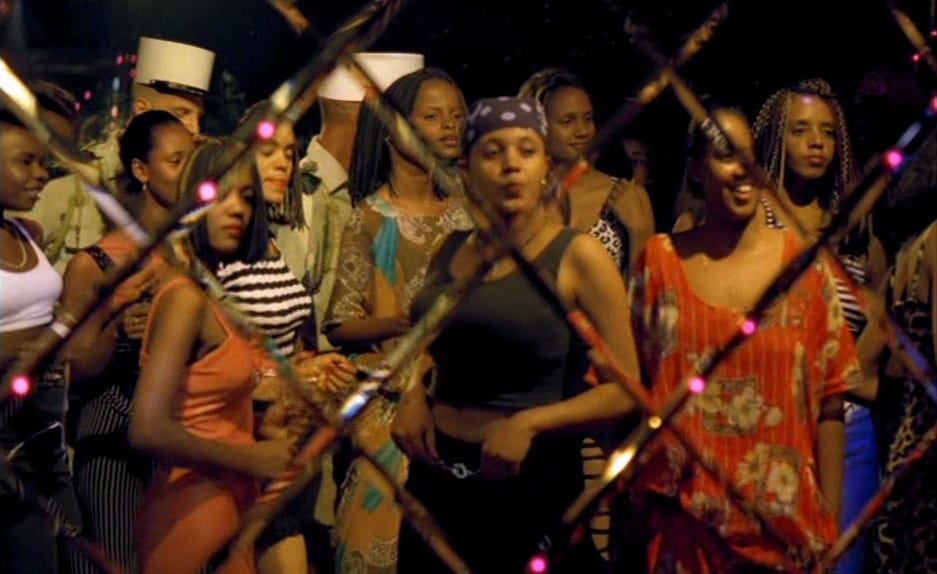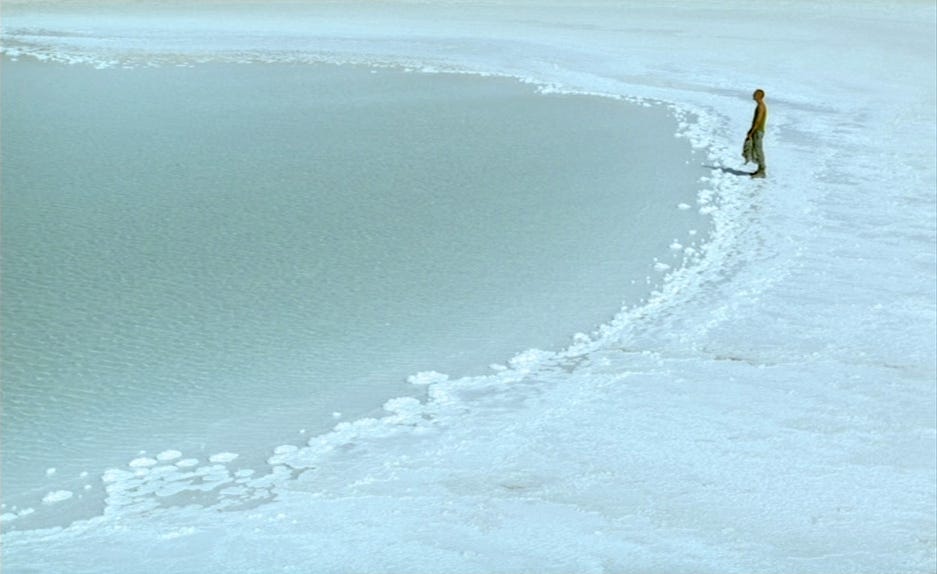Foreign film series #2
A later letter this week as I have, in true February fashion, come down with an awful cold. I am writing this curled up in bed at 9 PM on a cold Saturday night, throat aching and head stuffed.
In honour of my ailments and of London’s dreary winter weather, I thought I would write this week about a foreign film whose core compulsion is dependent on heat and sunlight – Claire Denis’ Beau Travail.
A more recent watch, Denis’ Beau Travail appeared on American screens in 1999 and is a careful story of contradictions. Critic Stephen Holden perfectly captured the film’s magnetic tension with the phrase “voluptuous austerity”. Originally commissioned by the French television channel ARTE as part of a series of films which explore “foreign lands”, Denis carefully twisted these conditions in order to capture not just a foreign place, but rather foreignness. Denis’ aim was to engage with not only the experience of being a foreigner in the geographic sense but also (in her words) to be “a foreigner to oneself.”
Denis’ film takes place in the present day in the former French colony of Djibouti, in East Africa. The story centres on a group of French Foreign Legionnaires who are stationed at a coastal output where the African landscape is transformed into something other-worldly, unforgiven terrain set against chiselled male bodies. Notably, Denis’ story is a loose adaptation of Herman Melville’s Billy Budd, the author’s famed unfinished novella finally published posthumously in 1924. While Melville’s story follows the noble young sailor Budd as he is executed for accidentally killing a bullying superior officer, Denis’ script follows Galoup (played by Denis Lavant), a stoic sergeant-major, who has been exiled from his east African Legion in disgrace.
His suffocating civilian life in Marseille is the result of previous actions borne out under the boiling African sun. While in the Legion, Galoup worked alongside his commanding officer Bruno (Michel Subor) with a dogged, unreciprocated loyalty bordering on something more. Bruno is uninterested in any happenings beyond those which conform to the severe routine of a soldier’s life. His beliefs remain enigmatic, however, as his sense of patriotic duty seems not to extend beyond the confines of his regiment; no love of King or country motivates his daily machinations.
Enter Gilles Sentain, played by Grégoire Colin, a new recruit whose arrival upends the careful balance of power between Galoup and Bruno. After rescuing a fellow soldier from a smoking helicopter crash, Sentain begins to attract the praise and attention of Bruno. This shift quietly enrages Galoup, who sets about transfiguring his jealousy into cruelty, eventually leading to Sentain’s near death and his own exile from the Legion.
Denis’ film is a mesmeric ballet capturing a regime of uncompromising brutality and beauty. It is a film that relishes silence, allowing cinematographer Agnès Godard to create a world replete with some of the most beautiful shots of the African landscape known to film. The film allows its narrative to develop unconventionally, as slow, lugubrious scenes suspend any expectation of a dialogue-driven story.
Rather, Denis treats her story less as a film, and much more as a ballet, periodically using the Britten opera score to set her metaphoric stage. Carefully choreographed scenes of the various exercises and drills conducted by Galoup and his men are drenched not simply in raw physicality, but also in scintillating homoeroticism. These scenes feel much closer to classical dance sequences, performed on a stage that only happens to resemble the Djiboutian landscape. Communal tableaux of movement merely anticipate the one-on-one confrontations between Sentain and Galoup where severity and sensuality are venerated in equal measure. Such artistic comparisons are far from innovative, as Denis herself explicitly juxtaposes the soldiers’ scenes with real dance sequences at various Djiboutian discotheques, dark rooms where Galoup finds his sole emotional connection to the Legion.
Beyond the male bodies that Denis captures, the discotheques also provide space for the women of the film, all of whom are black African. They appear sporadically throughout the film, dancing with the soldiers at the disco as equals; selling various wares as craftspeople (one of whom eventually saves Sentain); and as bemused observers to the Legion’s late-night escapades. Galoup’s Djiboutian girlfriend, Rahel (Marta Tafesse Kassa) seems to embody the fleeting but firm presence of women in Denis’ story as she, in one notable scene, gazes out towards the viewer with a calm, knowing look.
Women here are witnesses. They act, as Jonathan Rosenbaum has suggested, as the film’s Greek chorus, providing a critical and self-aware frame through which viewers are reminded to understand the presence of the French Legion and its various men in Africa.
“Capturing bodies on film is the only thing that interests me,” Denis has said, and that calling is what drives her ability to capture the homoerotic charge of the male bodies. This ability is also borne out in the closing scene of Beau Travail, perhaps one of the most astonishing endings in cinema that I have seen. Back in Marseille, Galoup makes his bed with military exactness before lying down on it and placing a gun to his bare stomach. The words “Sert la bonne cause et meurt” (“Serve the good cause and die”) are tattooed on his chest. His left bicep comes into view, a muscle twitching rhythmically. At the same time, the strains of Corona’s “The Rhythm of the Night” fade in and suddenly we are transported, along with Galoup, back to the disco. Dressed in black and surrounded by mirrors, Galoup begins to dance. Alone, his moves transform from something slow and controlled into an explosive dance driven by energy seemingly beyond Galoup’s control, whirling him around the room, onto the floor, and finally out of the frame in an ultimate moment of ecstasy.
Beau Travail treats jealousy and asceticism with surprising sympathy, asking viewers to sit with the quiet consequences of this callous thing called life.
If any of this sounds at all compelling, I urge you to take 90 minutes and give it a watch. I cannot recommend Denis’ work – or Melville’s story – highly enough. If anyone is also interested in following along with what I’m watching, here is a link to my Letterboxd!
That’s all for this week x
With love : Avery


